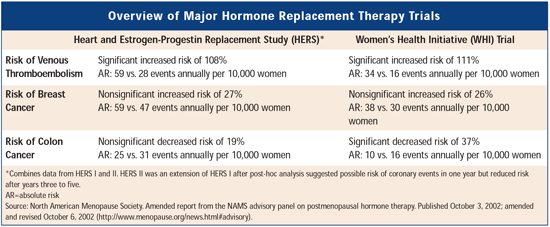
I would like to thank you and express my appreciation for having received the journal Geriatrics & Aging. I have been a practising family physician since 1996 after having completed a Fellowship in the Care for the Elderly at McGill University. I continue to actively work in geriatric care and have used your journal as an important source of information. Thank you once again.
Dr. Peter Blusanovics,
St. Mary's Hospital Centre, Montreal, QC.
I am a little puzzled by the overview of HRT trials in the article "Menopause: Current Controversies in Hormone Replacement Therapy" (Jan. 2003, Vol. 6, No. 1), which uses percentages to compare strategies. A large proportional change in a presently small value may mean little in practice, with the converse being the case.
The risk of thromboembolism is said to be increased 111% by HRT, which indeed it was found to be. However, "in the trenches", what we really need to know is that 9,966 women out of 10,000 will be clot-free in one year even on HRT, while 16 will clot without it. Thus, 9,982 will have futures unaffected by the decision to "go/no-go" on HRT. A problem for only 0.2% of women would perhaps not be justification for denying at least symptomatic benefits to all women.
Also puzzling is the evaluation that the increased/ decreased risks of breast and colorectal cancer are respectively said to be significant and nonsignificant. The U.S. Preventive Services Task Force (Ann Intern Med 2002;137:834-9) found just the opposite from the same numbers!
Most family physicians, like myself, are quite willing to practice "evidence-based medicine", if only we may be certain of what the evidence is.
Dr. George Ford,
Preston Medical Centre, Cambridge, ON.
Dr. Marla Shapiro, author of the article "Menopause: Current Controversies in Hormone Replacement Therapy", offered the following response to Dr. George Ford:
As family physicians, it is critical that we do practice evidence-based medicine. Physicians must have the knowledge base to inform their patients of the risks and benefits of available therapeutic options. With that base, an informed decision can be made not only on numbers, but also on how these numbers apply to that individual patient given their symptoms, their family history and alternate treatment options.
All of us practising medicine "in the trenches" are faced with the daily concerns of offering the best evidence-based medicine to our patients in a context that is relevant and useful. Ultimately, a patient is relying on her physician's expertise to interpret how a "nonsignificant increased risk of breast cancer at 26%, or eight more events per 10,000 women treated on an annual basis", applies to her. The intent of this article was to review our current state of knowledge following the Women's Health Initiative, so that as physicians we can use this information accurately.
Please note that the increased risk of breast cancer was found to be nonsignificant in WHI and HERS, and the decreased risk of colon cancer was found to be significant by WHI but nonsignificant by HERS (NAMS Advisory Panel, October 3, 2002).
Dr. Marla Shapiro,
Department of Family Medicine,
University of Toronto, Toronto, ON.

We want to hear from you! Please send letters to Geriatrics & Aging at 20 Eglinton Ave. W., Suite 1109, Toronto, ON M4R 1K8; Fax: (416) 480-2740 or email: info@geriatricsandaging.ca.


